In honor of Halloween, Deadshirt wants to get a little spooky. After a trip to the Death Spa, we’re heading home with 1977’s insane Criterion-certified classic House. You want teen school girls with one word descriptive names? You want dancing skeletons? You want a cat painting that barfs blood? Max Robinson and Chuck Winters have you covered with this conversation on director Nobuhiko Obayashi’s creepy funny masterpiece.
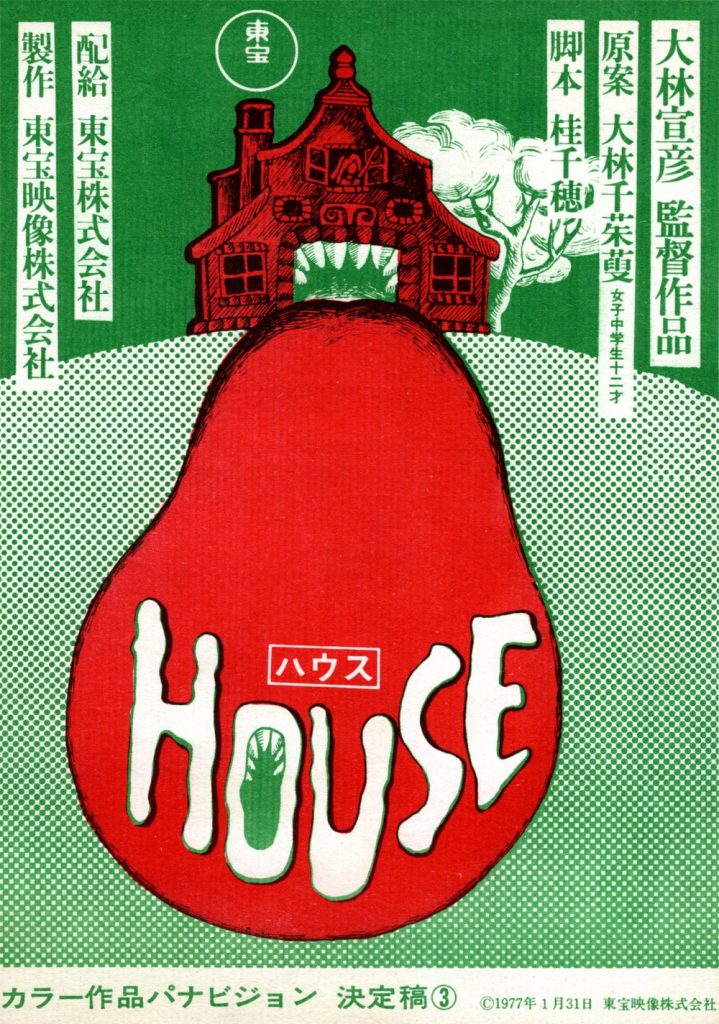
Max: House (or Hausu) is a movie that came on my radar a few years ago, and it’s since become one of my all-time favorite movies. I don’t really know how to explain House to someone who hasn’t experienced it; it’s easy to dismiss it as something that’s “so bad it’s good” at first blush, but honestly, it’s a great film built on a foundation of profound weirdness. Here’s the back-of-the-VHS-sleeve summary: A young school girl and her friends are invited to the country home of her aunt, who unbeknownst to anyone is a hungry ghoul living in a haunted house. Chuck, what did you think of it?
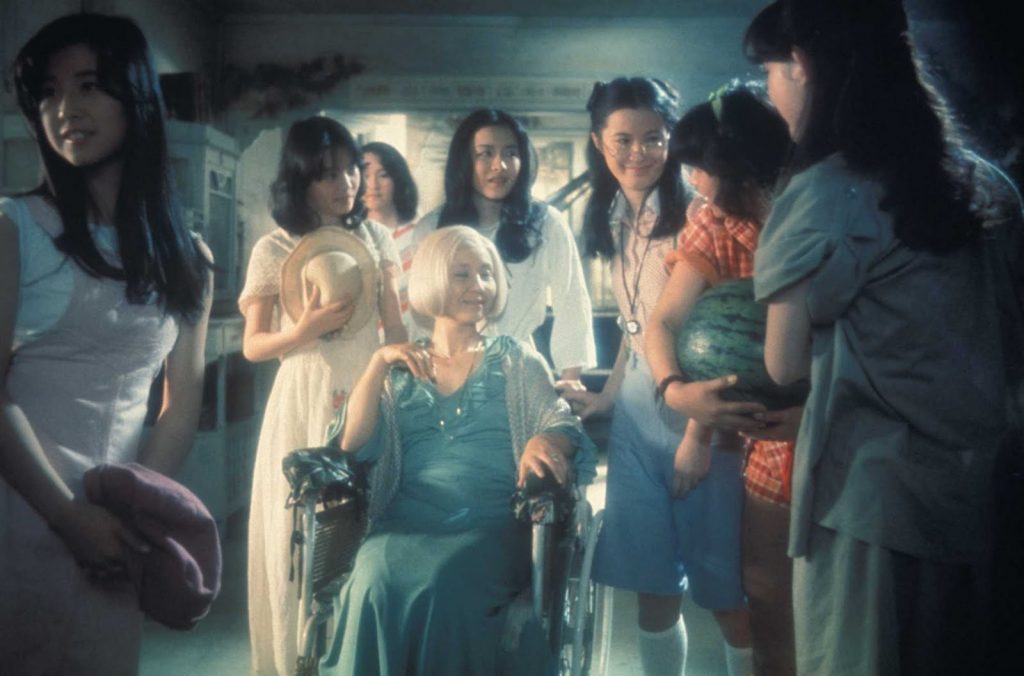
Chuck: Well, I should probably start with what I messaged you with when I first started watching it: “I’m only 7 minutes into House and I already feel like I’ve ingested a LOT of LSD.” Like, I should be upfront and admit that I hate horror movies; watching terrified teenagers / people get picked off one by one is not really my idea of a good time, because my empathy tends to kick into overdrive. But Nobuhiko Obayashi makes it clear from the jump that this is not happening anywhere close to reality. Even in the first act, everything is taking place on obvious sets, with matte backgrounds that feel weirdly off, with constant, cheerful music blasting in the background sometimes overlaid against each other. It creates this ridiculous, instantly unsettling effect. If Bryan Fuller told me House was a mild influence on his Hannibal, I’d believe him.
Max: The bits of this movie before Gorgeous and her friends get to the house feel like a Mentos commercial, which clicks once you realize Obayashi made his name directing commercials. The oppressively cheerful music and bright colors are such a great contrast to the film’s sequences in the countryside, which are equally vibrant but heavier on cannibalism. This movie feels incredibly realized and polished for something that’s both a directorial debut and essentially written by the director’s pre-teen daughter.
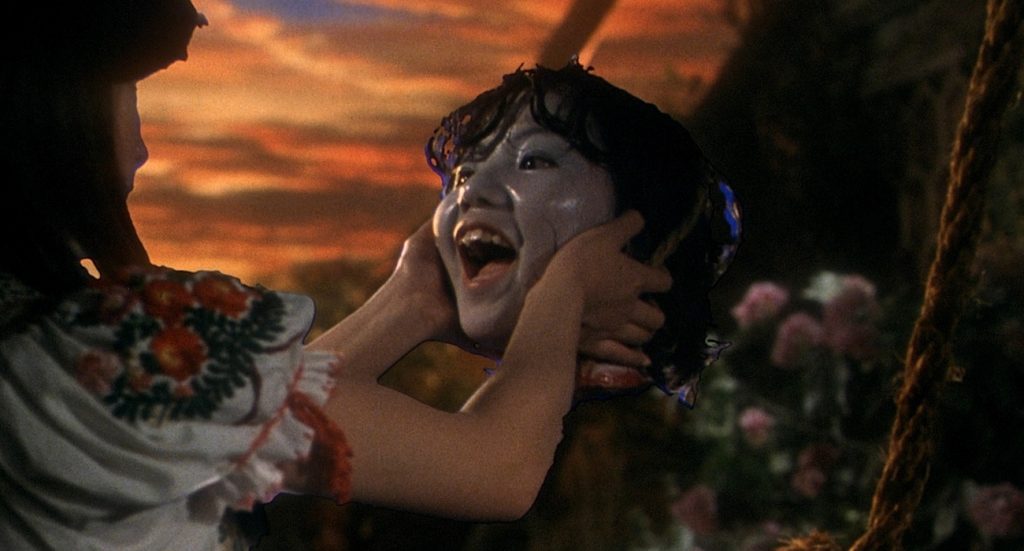
Chuck: It goes to show how cynical I am that I was watching a girl’s severed head bite another girl on the butt, or an evil cat meowing along to the theme song, and thinking “This is the product of a diseased mind.” But once I realized that Obayashi basically asked his daughter what scared her and put that into the film, it made perfect sense. This is literally a little girl’s idea of a horror movie: it’s scary, but it’s playful and all in good fun, not really meant to make you sleep with the lights on.
Max: House is profoundly disturbing, but not in a traditional horror movie way? It’s disarming when, say, Gorgeous’ sinister aunt pops open her mouth to reveal an eyeball, but it’s not a scare so much as it is the movie sticking your hands in some spaghetti and peeled grapes. The most traditional horror movie element we get is a girl’s severed head flying out of a well to bite a butt, and that’s almost immediately overshadowed by the fact that the head turns into a watermelon and gets eaten. You can call House a lot of things, but you sure can’t call it boring.
Chuck: The true horror of the movie, at least for me, is how hard it is to wrap your head around it. Halfway through, I gave up the notion of an unspoiled watch and darted over to Wikipedia to see what I was in for, and even then, actually watching this absurd horror play out in front of my eyes left me dumbstruck. One thing I noticed: most of the girls were named after their traits. Kung Fu does Kung Fu, Sweet is always helpful, Melody plays music, etc. The only names that don’t really fit specific personality traits, Gorgeous and Fantasy, are the two that form the central relationship of the film. Although with Fantasy, you can argue that her thing is that she’s always leaning on the idea that someone else will rescue her?

Max: There are definitely some Layers to this film beyond a piano eating a girl alive while some skeletons dance. I’ve been hesitant to write about House for years because I’m not super familiar with Japanese film to the point that I can bring up context, but you’ve got teenage girls cheerfully describing footage of an atomic bomb as “like cotton candy” in a movie only 30 years or so after Hiroshima/Nagasaki. It’s hard to pin down exactly what House is “about,” but there’s certainly something being said here about the end of childhood and the looming spectre of adult life.
Chuck: Well, Very Serious Wikipedia Research tells me that Obayashi actually grew up in Hiroshima and lost all his childhood friends to the bomb, and he was definitely influenced by that. The idea is that the aunt—or her spirit—was twisted up by how she lost her love to the war and, in turn, devoured these hapless innocents who grew up untouched by the spectre of that devastation. But while such themes are a strong backbone, I can’t help but feel that innocence is really being celebrated here. After all, the surreality that makes House so unique even to this day could only come from innocence, from fears that come from a purely unchecked imagination as opposed to those grounded in reality, like serial killers or natural disasters. Hell, even your average ghost stories and creature features have rules. The Predator can only see with heat vision. A ghost will fuck with objects in ways that other human beings could, it just doesn’t make sense because it’s not corporeal. This is something way the hell else.
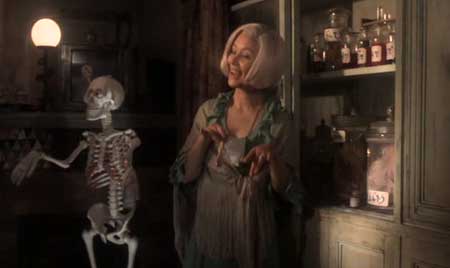
Max: House wouldn’t really work if Obayashi didn’t more or less refuse to explain anything. All we know is that Gorgeous’ aunt “died” but her body lives on, apparently so she can feed on locals and honeypot her well-meaning niece in a bodyswapping scheme. While the film delights in picking off each girl until only a distinctly different Gorgeous is left, it never feels mean spirited?
Chuck: Yeah, you can’t really feel too bad for a girl getting eaten by a piano when her severed head hovers over the scene, looks between her exposed legs, and says “Ooh, that’s naughty!” I think the meanest it got was when it implied that their teacher(?) Mr. Tôgô might be able to stop this if he pulled up to the house and essentially took the place of the aunt’s dead lover, only to show how that wasn’t happening because he’s a total jamoke. And that’s IF you can call it “mean.” I might, but I’d feel really weird about it, because it still feels like a genuine punishment of Fantasy’s unhealthy obsession with the man—and anyway, what would’ve happened to him if he DID walk through that door? Again, Obayashi never really explains, but I can’t assume it’s anything good.
Max: Mr. Tôgô, who interacts with some kind of noodle-serving bear without comment or a raised eyebrow. It’s a whole movie built on dream logic, up to and including the uncomfortable dread-inducing ending where Gorgeous is finally subsumed by her aunt and welcomes her stepmother inside. House is a movie that really stays with you, to the point that my non-horror movie watching friend Tyler saw 20 minutes of it one time and had nightmares. What stuck with you days after seeing this for the first time?
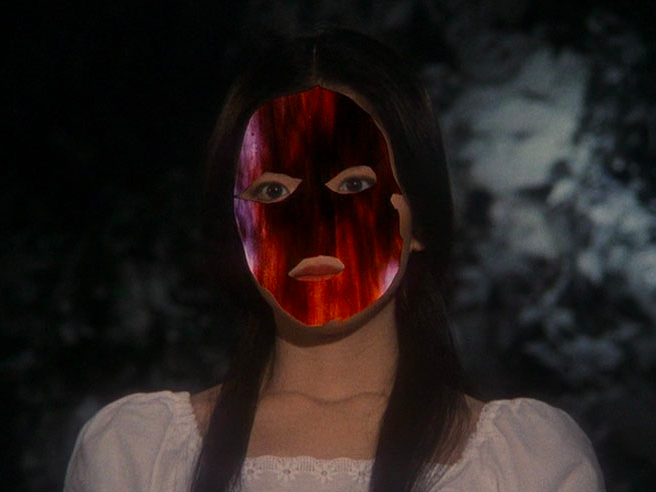
Chuck: A lot of it, really, though not necessarily in order. The special effects that look like they were done in crayon (especially the face that was drawn onto the cat), the demented use of stop-motion, the damn-near Lynchian setup of the whole thing, the way the aunt reappears and mugs into the camera after Fantasy freaks out about her walking into the refrigerator…it’s a lot of potent imagery that I need to see again to process without being sure that I really WANT to see it again, if that makes sense.
Max: House is the kind of movie that makes you appreciate the Criterion Collection’s willingness to include stuff outside more traditional art movie titles and classics. That this is readily available on MULTIPLE streaming platforms is some kind miracle of preservation.
Chuck: I’ve always said that there are films you should watch not necessarily because you’ll like them, but because you need to know they exist. House is definitely one of those.


